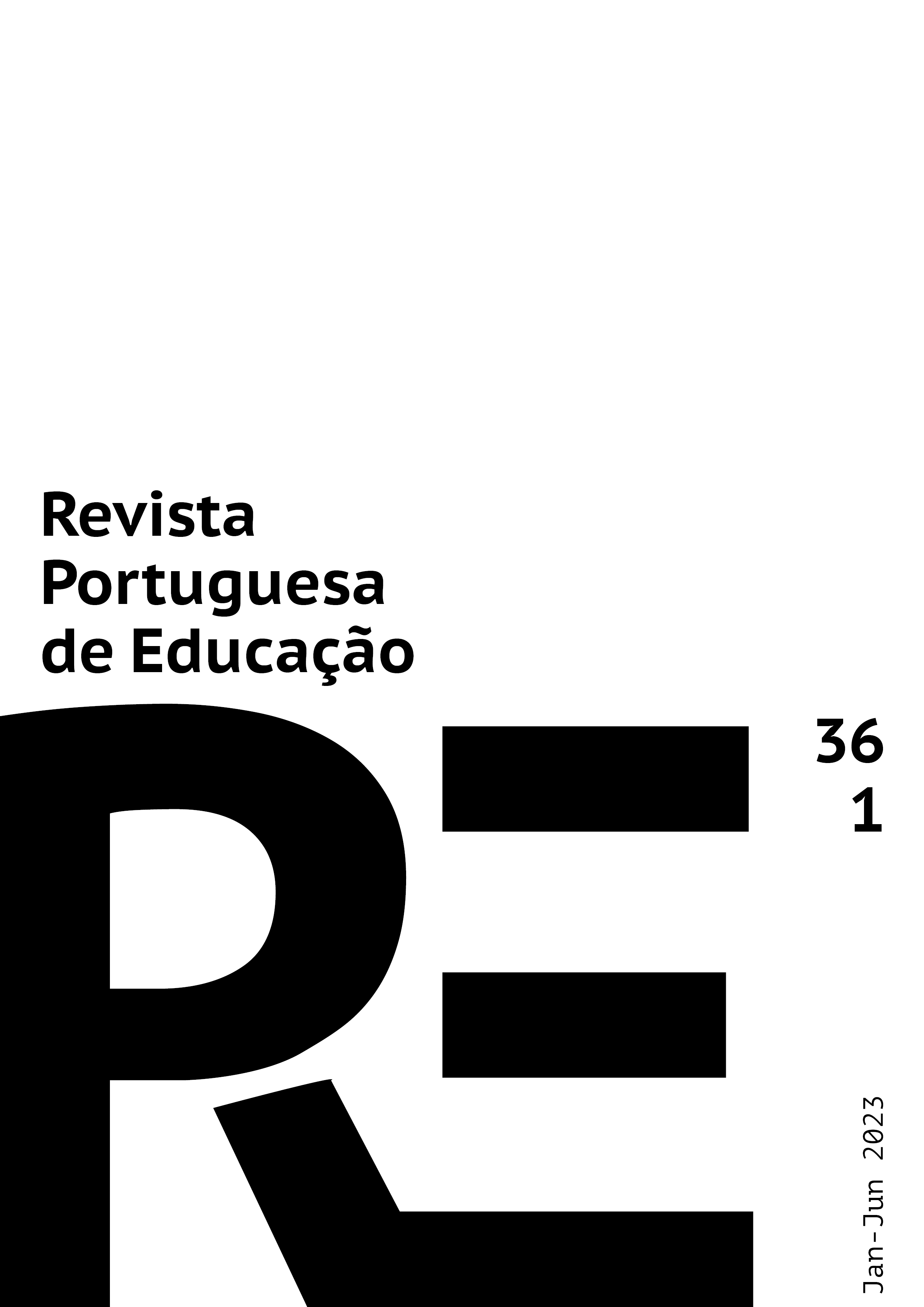Knowledge taught, target students and intentionalities in the early days of evening school (Rio Grande do Sul, Brazil, 1884-1937)
DOI:
https://doi.org/10.21814/rpe.24717Keywords:
Evening schools, Poor students, Schooling, Periodical pressAbstract
This article presents the analysis of the mentions to the evening schools located in the newspaper A Federação, a republican and abolitionist periodical that circulated in Rio Grande do Sul, Brazil, between 1884 and 1937. The research develops dialogues with other studies of the History of Education and mobilizes theoretical contributions of the History of Concepts, as proposed by Koselleck (2006), in order to identify the purposes of the classes offered at night, the knowledge taught and the intended public. The analysis pointed the coexistence of different scopes in the same period, so that, in some cases, the evening adjective referred to the provision of preparation and improvement courses for work, such as market bookkeeping or topographical design, whereas, in other cases, it dealt with elementary education for poor kids, women, and adult and child workers.
Downloads
References
A Federação: Orgam do Partido Republicano. (1884-1937). Porto Alegre.
Barros, J. D. (2017). Os conceitos na história: Considerações sobre o anacronismo. Revista Ler História, 71, 155-180. https://doi.org/10.4000/lerhistoria.2930
Boto, C. (1994/1995). Nacionalidade, escola e voto: A Liga Nacionalista de São Paulo. Perspectivas: Revista de Ciências Sociais, 17-18, 145-163. http://seer.fclar.unesp.br/perspectivas/article/view/1982
Castellanos, S. L. V., & Castro, C. A. (2015). Uma instituição de ensino popular no Maranhão império: A Sociedade Onze de Agosto. Revista HISTEDBR On-line, 15(62), 83-97. https://doi.org/10.20396/rho.v15i62.8640495
Dihl, T. L. (2017). Plurais (in)visibilidades: Representações republicanas sobre o negro (Jornal A Federação – RS, 1884-1903) [Dissertação de mestrado, Universidade do Vale dos Sinos]. Repositório Digital da Biblioteca da Unisinos. http://www.repositorio.jesuita.org.br/handle/UNISINOS/6243
Gil, N. L. (2020). A escolarização na cidade de Porto Alegre nas primeiras décadas do século XX. In J. E. Souza (Ed.), Escola no Rio Grande do Sul (1889-1950): Ensino, culturas e práticas escolares (pp. 130-152). EDUCS.
Gonçalves Neto, W. (2005). História e memória da educação: A organização do sistema escolar em Uberabinha, MG, no final do século XIX. Revista História da Educação, 9(17), 137-156. https://seer.ufrgs.br/index.php/asphe/article/view/29205
Gouveia, M. C. S. (2004). Tempos de aprender: A produção histórica da idade escolar. Revista Brasileira de História da Educação, 4(2), 265-288. https://periodicos.uem.br/ojs/index.php/rbhe/article/view/38690/20219
Hébrard, J. (1990). A escolarização dos saberes elementares na época moderna. Teoria & Educação, 2, 65-104. https://pt.scribd.com/document/374980355/A-Escolarizacao-Dos-Saberes-Elementares-Na-Epoca-Moderna-jean-Hebrard
Koselleck, R. (2006). O futuro passado: Contribuição à semântica dos tempos históricos. Contraponto Editora & Editora PUC-RIO.
Louro, G. L. (1986). Prendas e antiprendas: Uma história da educação feminina no Rio Grande do Sul [Tese de doutoramento, Universidade Estadual de Campinas]. Repositório da Produção Científica e Intelectual da UNICAMP. https://hdl.handle.net/20.500.12733/1574629
Luca, T. R. (2005). História dos, nos e por meio dos periódicos. In C. Pinsky (Ed.), Fontes históricas (pp. 111-153). Contexto.
Peres, E. T. (2000). Aprendendo formas de pensar, de sentir e de agir: A escola como oficina da vida – Discursos pedagógicos e práticas escolares da escola pública primária gaúcha (1909-1959) [Tese de doutoramento, Universidade Federal de Minas Gerais]. https://wp.ufpel.edu.br/hisales/files/2015/02/Tese-Eliane-Peres.pdf
Peres, E. T. (2002). “Templo de luz”: Os cursos noturnos masculinos de instrução primária da Biblioteca Pública Pelotense (1875-1915) [Dissertação de mestrado, Universidade Federal do Rio Grande do Sul].
Ribeiro, B. O. L., & Silva, E. F. (2011). Educação e domínio: Escola como ilusão de inclusão social do “negro” no Brasil da década de 1930. Cadernos de História da Educação, 9(2) 363-375. http://www.seer.ufu.br/index.php/che/article/view/11451
Rodrigues, A. S., & Rossi, E. R. (2009). Educação de jovens e adultos: Memórias do grupo escolar noturno Visconde de Nácar em Maringá (1947-1958). Revista HISTEDBR On-line, 9(35), 29-47. https://doi.org/10.20396/rho.v9i35.8639612
Saraiva, E. S. V. (2017) A polissemia do conceito fracasso escolar em uma fonte histórica digital (1980-2009) [Dissertação de mestrado, Universidade Federal do Rio Grande do Sul]. Repositório Digital da UFRGS. http://hdl.handle.net/10183/165671
Souza, J. F. (2000). Governando mulheres e crianças: Jardins de Infância em Porto Alegre na primeira metade do século XX [Tese de doutoramento, Universidade Federal do Rio Grande do Sul]. Repositório Digital da UFRGS. http://hdl.handle.net/10183/246318
Stephanou, M. (1990). Forjando novos trabalhadores: A experiência do ensino técnico-profissional no Rio Grande do Sul (1890-1930) [Dissertação de mestrado, Universidade Federal do Rio Grande do Sul]. Repositório Digital da UFRGS. http://hdl.handle.net/10183/182140
Veiga, C. G. (2005). A produção da infância nas operações escriturísticas da administração da instrução elementar no século XIX. Revista Brasileira de História da Educação, 5(1), 73-107. https://periodicos.uem.br/ojs/index.php/rbhe/article/view/38657
Downloads
Published
How to Cite
Issue
Section
License
Copyright (c) 2023 Natália Gil, Luísa Grando

This work is licensed under a Creative Commons Attribution-ShareAlike 4.0 International License.
1. The authors preserve their authorship and grant the Portuguese Journal of Education the right to the first publication. The work is licensed under Creative Commons Attribution License that allows sharing the work with the acknowledgment of initial authorship and publication in this Journal.
2. The authors have the right to take additional contracts separately, for non-exclusive distribution of the published version of their work (e.g. to deposit in an institutional repository or as a book chapter), acknowledging the initial authorship and publication in this Journal.
3. The authors have the permission and are stimulated to post their work online (e.g. in an institutional repository or on their personal website). They can do this at any phase of the editorial process, as it may generate productive changes, as well as increase impact and article citation (see The Open Citation Project).
The work is licensed under Attribution-ShareAlike 4.0 International (CC BY-SA 4.0)




















